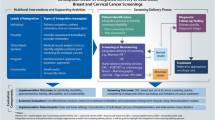Abstract
Colorectal cancer (CRC) screening has been supported by strong research evidence and recommended in clinical practice guidelines for more than a decade. Yet screening rates in the United States remain low, especially relative to other preventable diseases such as breast and cervical cancer. To understand the reasons, the National Cancer Institute and Agency for Healthcare Research and Quality sponsored a review of CRC screening implementation in primary care and a program of research funded by these organizations. The evidence base for improving CRC screening supports the value of a New Model of Primary Care Delivery: 1. a team approach, in which responsibility for screening tasks is shared among other members of the practice, would help address physicians’ lack of time for preventive care; 2. information systems can identify eligible patients and remind them when screening is due; 3. involving patients in decisions about their own care may enhance screening participation; 4. monitoring practice performance, supported by information systems, can help target patients at increased risk because of family history or social disadvantage; 5. reimbursement for services outside the traditional provider—patient encounter, such as telephone and e-mail contacts, may foster enhanced screening delivery; 6. training opportunities in communication, cultural competence, and use of information technologies would improve provider competence in core elements of screening programs. Improvement in CRC screening rates largely depends on the efforts of primary care practices to implement effective systems and procedures for screening delivery. Active engagement and support of practices are essential for the enormous potential of CRC screening to be realized.

Similar content being viewed by others
References
Walsh JM, Terdiman JP. Colorectal cancer screening: scientific review. JAMA. 2003;289:1288–96.
Smith RA, Cokkinides V, von Eschenbach AC, et al. American Cancer Society guidelines for the early detection of cancer. CA Cancer J Clin. 2002;52:8–22.
U.S. Preventive Services Task Force. Screening for colorectal cancer: recommendation and rationale. Ann Intern Med. 2002;137:129–31.
Winawer SJ, Fletcher RH, Miller L, et al. Colorectal cancer screening and surveillance: clinical guidelines and rationale-updated based on new evidence. Gastroenterology. 2003;124:544–60.
Shea S, DuMouchel W, Bahamonde L. A meta-analysis of 16 randomized controlled trials to evaluate computer-based clinical reminder systems for preventive care in the ambulatory setting. J Am Med Inform Assoc. 1996;3:399–409.
Snell JL, Buck EL. Increasing cancer screening: a meta-analysis. Prev Med. 1996;25:702–7.
Vernon SW. Participation in colorectal cancer screening: a review. J Natl Cancer Inst. 1997;89:1406–22.
Balas EA, Weingarten S, Garb CT, et al. Improving preventive care by prompting physicians. Arch Intern Med. 2000;160:301–8.
Peterson SK, Vernon SW. A review of patient and physician adherence to colorectal cancer screening guidelines. Semin Colon Rectal Surg. 2000;11:58–72.
Pignone M, Harris R, Kinsinger L. Videotape-based decision aid for colon cancer screening. A randomized, controlled trial. Ann Intern Med. 2000;133:761–9.
Dietrich AJ, Tobin JN, Cassells A, et al. Telephone care management to improve colorectal cancer screening among low-income women: a randomized, controlled trial. Ann Intern Med. 2006;144:563–71.
Klabunde CN, Riley GF, Mandelson MT, et al. Health plan policies and programs for colorectal cancer screening: a national profile. Am J Manag Care. 2004;10:273–9.
Yarnall KSH, Pollak KI, Ostbye T, Krause KM, Michener L. Primary care: is there enough time for prevention? Am J Public Health. 2003;93:635–41.
Kroenke K. The many c’s of primary care. J Gen Intern Med. 2004;19:708–9.
Martin JC, Avant RF, Bowman MA, et al. The Future of Family Medicine: a collaborative project of the family medicine community. Ann Fam Med. 2004;2(Suppl 1):S3–32.
Larson EB, Fihn SD, Kirk LM, et al. The future of general internal medicine. Report and recommendations from the Society of General Internal Medicine (SGIM) Task Force on the Domain of General Internal Medicine. J Gen Intern Med. 2004;19:69–77.
Zapka JG, Taplin SH, Solberg LI, Manos MM. A framework for improving the quality of cancer care: the case of breast and cervical cancer screening. Cancer Epidemiol Biomark Prev. 2003;12:4–13.
Greco PJ, Eisenberg JM. Changing physicians’ practices. New Eng J Med. 1993;329:1271–4.
Robertson N, Baker R, Hearnshaw H. Changing the clinical behavior of doctors: a psychological framework. Qual Health Care. 1996;5:51–4.
Grimshaw JM, Eccles MP, Waler AE, Thomas RE. Changing physicians’ behavior: what works and thoughts on getting more things to work. J Contin Educ Health Prof. 2002;22:237–43.
Davis DA, Thomson MA, Oxman AD, Haynes B. Changing physician performance: a systematic review of continuing medical education strategies. JAMA. 1995;274:700–5.
Stone E, Morton SC, Hulscher ME, et al. Interventions that increase use of adult immunization and cancer screening services: a meta-analysis. Ann Intern Med. 2002;136:641–51.
Litaker D, Flocke SA, Frolkis JP, Stange KC. Physicians’ attitudes and preventive care delivery: insights from the DOPC study. Prev Med. 2005;40:556–63.
Sandy LG, Schroeder SA. Primary care in a new era: disillusion and dissolution? Ann Intern Med. 2003;138:262–7.
Landon BE, Reschovsky J, Blumenthal D. Changes in career satisfaction among primary care and specialist physicians, 1997–2001. JAMA. 2003;289:442–9.
Moore G, Showstack J. Primary care medicine in crisis: toward reconstruction and renewal. Ann Intern Med. 2003;138:244–7.
Thompson NJ, Boyko EJ, Dominitz JA, et al. A randomized trial of a clinic-based support staff intervention to increase the rate of fecal occult blood test ordering. Prev Med. 2000;30:244–51.
Maule WF. Screening for colorectal cancer by nurse endoscopists. N Engl J Med. 1994;330:183–7.
Wallace MB, Kemp JA, Meyer F, et al. Screening for colorectal cancer with flexible sigmoidoscopy by nonphysician endoscopists. Am J Med. 1999;49:158–62.
Schoenfeld PS, Cash B, Kita J, Piorkowski M, et al. Effectiveness and patient satisfaction with screening flexible sigmoidoscopy performed by registered nurses. Gastrointest Endosc. 1999;107:214–8.
Carpiano RM, Flocke SA, Frank SH, Stange KC. Tools, teamwork, and tenacity: an examination of family practice office system influences on preventive service delivery. Prev Med. 2003;36:131–40.
Sansbury LB, Klabunde CN, Mysliwiec P, et al. Physicians’ use of nonphysician healthcare providers for colorectal cancer screening. Am J Prev Med. 2003;25:179–86.
Meissner HI, Breen N, Klabunde CN, et al. Patterns of colorectal cancer screening uptake among men and women in the United States. Cancer Epidemiol Biomark Prev. 2006;15:389–94.
Audet AM, Davis K, Schoenbaum SC. Adoption of patient-centered care practices by physicians: results from a national survey. Arch Intern Med. 2006;166:754–9.
Zapka JG, Lemon SC. Interventions for patients, providers, and health care organizations. Cancer. 2004;101(5 Suppl):1165–87.
Jamtvedt G, Young JM, Kristoffersen DT, et al. Audit and feedback: effects on professional practice and health care outcomes. Cochrane Database Sys Rev. 2003;(3):CD000259.
Grant RW, Campbell EG, Gruen RL, et al. Prevalence of basic information technology use by U.S. physicians. J Gen Intern Med. 2006;21:1150–5.
Jimbo M, Nease DE, Ruffin MT, et al. Information technology and cancer prevention. CA Cancer J Clin. 2006;56:26–36.
Price M. Can hand-held computers improve adherence to guidelines? A pilot study of family doctors in British Columbia. Can Fam Physician. 2005;51:1506–7.
O’Connor AM, Stacey D, Entwistle V, et al. Decision aids for people facing health treatment of screening decisions. Cochrane Database Sys Rev. 2003;(2):CD001431.
Pignone M, Bucholtz D, Harris R. Patient preferences for colon cancer screening. J Gen Intern Med. 1999;14:432–7.
Dolan JG. Patient priorities in colorectal cancer screening decisions. Health Expect. 2005;8:334–44.
Messina CR, Lane DS, Grimson R. Colorectal cancer screening attitudes and practices: preferences for decision making. Am J Prev Med. 2005;5:439–46.
Levy BT, Dawson J, Hartz AJ, et al. Colorectal cancer testing among patients cared for by Iowa family physicians. Am J Prev Med. 2006;31:193–201.
Greiner KA, Engelman KK, Hall MA, et al. Barriers to colorectal cancer screening in rural primary care. Prev Med. 2004;38:269–75.
Flocke SA, Stange KC, Zyzanski SJ. The association of attributes of primary care with the delivery of clinical preventive services. Med Care. 1998;36(Suppl 8):AS21–30.
Sontag SJ, Durczak C, Aranha GV, et al. Fecal occult blood screening for colorectal cancer in a Veterans Administration hospital. Am J Surg. 1983;145:89–94.
Ling BS, Moskowitz MA, Wachs D, et al. Attitudes toward colorectal cancer screening tests. J Gen Intern Med. 2001;16:822–30.
Denberg TD, Melhado TV, Coombes JM, et al. Predictors of nonadherence to screening colonoscopy. J Gen Intern Med. 2005;20:989–95.
Briss P, Rimer B, Reilley B, et al. Promoting informed decisions about cancer screening in communities and healthcare systems. Am J Prev Med. 2004;26:67–80.
Patel P, Forjuoh SN, Avots-Avotins A, et al. Identifying opportunities for improved colorectal cancer screening in primary care. Prev Med. 2004;39:239–46.
Stange KC, Zyzanski SJ, Jaen CR, et al. Illuminating the black box. A description of 4454 patient visits to 138 family physicians. J Fam Pract. 1998;46:377–89.
Fairfield KM, Chen WY, Colditz GA, et al. Colon cancer risk counseling by health-care providers: perceived barriers and response to an internet-based cancer risk appraisal instrument. J Cancer Educ. 2004;19:95–7.
Klabunde CN, Vernon SW, Nadel MR, et al. Barriers to colorectal cancer screening: a comparison of reports from primary care physicians and average-risk adults. Med Care. 2005;43:939–44.
Lewis JD, Asch DA. Barriers to office-based screening sigmoidoscopy: does reimbursement cover costs? Ann Intern Med. 1999;130:525–30.
Brown ML, Klabunde CN, Mysliwiec P. Current capacity for endoscopic colorectal cancer screening in the United States: data from the National Cancer Institute Survey of Colorectal Cancer Screening Practices. Am J Med. 2003;115:129–33.
Wigton RS, Alguire P. The declining number and variety of procedures done by general internists: a resurvey of members of the American College of Physicians. Ann Intern Med. 2007;146:355–60.
McInerny TK, Cull WL, Yudkowsky BK. Physician reimbursement levels and adherence to American Academy of Pediatrics well-visit and immunization recommendations. Pediatrics. 2005;115:833–8.
Rosenthal MB, Frank RG, Li A, et al. Early experience with pay-for-performance: from concept to practice. JAMA. 2005;294:1788–93.
Pourat N, Rice T, Tai-Seale M, et al. Association between physician compensation methods and delivery of guideline-concordant STD care: is there a link? Am J Manag Care. 2005;11:426–32.
Roski J, Jeddeloh R, An L, et al. The impact of financial incentives and a patient registry on preventive care quality: increasing provider adherence to evidence-based smoking cessation practice guidelines. Prev Med. 2003;36:291–9.
Wee CC, Phillips RS, Burstin HR, et al. Influence of financial productivity incentives on the use of preventive care. Am J Med. 2001;110:181–7.
Hillman AL, Ripley K, Goldfarb N, et al. Physician financial incentives and feedback: failure to increase cancer screening in Medicaid managed care. Am J Public Health. 1998;88:1699–701.
Nadel MR, Shapiro JA, Klabunde CN, et al. A national survey of primary care physicians’ methods for screening for fecal occult blood. Ann Intern Med. 2005;142:86–94.
Costanza ME, Hoople NE, Gaw VP, et al. Cancer prevention practices and continuing education needs of primary care physicians. Am J Prev Med. 1993;9:107–12.
Vogelaar I, van Ballegooijen M, Schrag D, et al. How much can current interventions reduce colorectal cancer mortality in the U.S.? Mortality projections for scenarios of risk-factor modification, screening, and treatment. Cancer. 2006;107:1624–33.
Financial Support and Disclosure
Funding support for this review was provided by the National Cancer Institute and the Agency for Healthcare Research and Quality.
Potential Financial Conflicts of Interest
None disclosed.
Author information
Authors and Affiliations
Corresponding author
Appendices
Appendix A
Appendix B
Rights and permissions
About this article
Cite this article
Klabunde, C.N., Lanier, D., Breslau, E.S. et al. Improving Colorectal Cancer Screening in Primary Care Practice: Innovative Strategies and Future Directions. J GEN INTERN MED 22, 1195–1205 (2007). https://doi.org/10.1007/s11606-007-0231-3
Received:
Revised:
Accepted:
Published:
Issue Date:
DOI: https://doi.org/10.1007/s11606-007-0231-3




